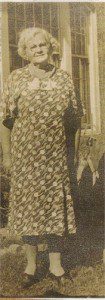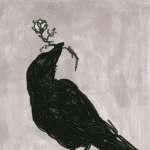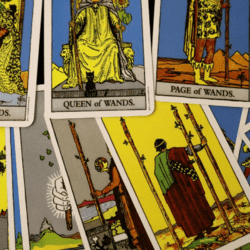 Two important aspects for me in heathenry are honoring the wights of the land and my ancestors. When I moved to a rural homestead, it was with the intent that I would return to the ways of my great-grandparents who had proudly raised horses and provided for their children solely with what they could grow and glean from their land. Homesteading was, in my mind, a way of honoring my ancestors, and it came with an opportunity to preserve and care for my own land while also supporting my own family.
Two important aspects for me in heathenry are honoring the wights of the land and my ancestors. When I moved to a rural homestead, it was with the intent that I would return to the ways of my great-grandparents who had proudly raised horses and provided for their children solely with what they could grow and glean from their land. Homesteading was, in my mind, a way of honoring my ancestors, and it came with an opportunity to preserve and care for my own land while also supporting my own family.
I quickly learned that there is a whole lot more to honoring my ancestors and the land then relying on my good intentions. I realized the first time that I attempted to plow a quarter-acre garden full of clay soil that my intent wasn’t going to be good enough. Anyone who gardens knows that clay soil that has never been amended is almost impossible to till, much less grow anything in. I remembered my great-grandfather adding lime and fertilizer to his gardens, so I employed help from a nearby farmer to help me amend my soil. My land was going to be an organic setting for livestock, beautiful gardens, the healthiest sunflowers, and whatever else I wanted to grow. I was the embodiment of idealism.
I immediately set the rows and spread my carefully selected seeds. Weeks passed, and I eagerly awaited the first signs of life that would spring forth, like something out of the best gardening magazine. I would make an offering of my bountiful first harvest and thank the gods for the good fortune in agriculture that my ancestors had also enjoyed. The gods would certainly shine forth their agricultural prosperity on me, right? After all, I was full of good intentions.
You can imagine my surprise when my carrots never grew, my greens were eaten by Japanese beetles, the cantaloupe looked like golf ball-sized rocks, and my bush beans never bushed. The only thing my first harvest resulted in boiled down to a few tomatoes, some snap peas, and a meager assortment of okra and lima beans. My great-grandparents, I knew, would not have been impressed. I had wrongly assumed that my intentions would mean that I would succeed; in making the offerings I wanted to make something of true value, and I thought the gods would smile in favor of it.
 Now, I’d like to think that if my great-grandparents were still alive, they would have patted me on the back with a reassuring word that if I just kept my head up it would all turn out well. But my great-grandfather would’ve never issued that sort of remark, and I knew it. I had watched him for years milk, garden, plow, cull, and build. The work day didn’t stop just because five o’clock rolled around, and it began at first light when the family rooster called. I had to do better if I wanted to honor them.
Now, I’d like to think that if my great-grandparents were still alive, they would have patted me on the back with a reassuring word that if I just kept my head up it would all turn out well. But my great-grandfather would’ve never issued that sort of remark, and I knew it. I had watched him for years milk, garden, plow, cull, and build. The work day didn’t stop just because five o’clock rolled around, and it began at first light when the family rooster called. I had to do better if I wanted to honor them.
I began researching pH balances in the soil, what type of feed was best suited for laying hens, and how to correctly milk a goat. I explored making different types of butter and cheese. I learned how to make soap. It took a great deal of time and research – in much the same way that studying heathenry requires if one is to truly practice the rites and understand the worldview of the elder heathens. Proper studying and application yielded results where my previous idealistic tendencies didn’t. Building something of value and worth to my family and ancestors required study and practical application of my ancestors’ ways. It continues to be an ongoing learning process.
Though I was not, initially, trying to reconstruct all of the ancient ways of my family line, I wanted a lifestyle that echoed the practices with which my ancestors provided for their own children. I wanted to succeed, but to do that it took a great deal of research, help, and studying material that didn’t rely on daydreams of perfect grand gardens. I first had to learn how to grow the foods suitable to my area and which pests could be controlled naturally. Step by step, I learned to apply this knowledge, and eventually was able to make an offering of my harvest that I was proud of.
Not everyone has the desire to homestead and live off the land, though in heathenry there is a healthy respect and acknowledgment of land spirits. The land wights on my farm are honored with offerings and given their own space. This was my way of returning to my homegrown farming roots in respect to my ancestors. For someone else, that choice may be entirely different.
If there are less than favorable memories of a particular family member, then it can be easier to select a few aspects about their personality that made them strong, capable, or independent. Those elements can then be used to honor that person as an individual.
Some people are concerned that they don’t have any heathen relatives they can recall to observe. It’s not necessary that an ancestor have been heathen in order to commemorate them. You can recognize their family contributions, hard work, or other aspects without incorporating their religion. When honoring the Disir, paying specific attention to the attributes of one’s female ancestors can help establish a more personal connection to them.
Honoring our ancestors is an integral part of heathenry. They are undeniably linked to us, and our existence. For me, that meant returning to the farming roots that are found on both my mother’s and father’s side. For someone else, it could mean something entirely different. However, keeping our ancestors a part of our lives and giving them specific recognition is an important part of our religious practice.
Heathen Woman is published on alternate Fridays. Subscribe via RSS or e-mail!













